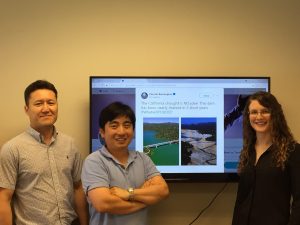
A group of researchers affiliated with the Alabama Water Institute is working to understand society’s perspective of slow-changing weather events and create disaster response plans based on those views.
Kimberly Stowers is an assistant professor in management in The University of Alabama’s Culverhouse College of Business where her primary area of research is human-technology interaction. She is collaborating with Jonghun Kam, an assistant professor in civil, construction and environmental engineering who studies surface hydrology, and Aibek Musaev, an assistant professor in computer science who researches data mining and social network analysis.
The team is currently focusing on social behaviors and drought management.
“I met Dr. Kam at my poster presentation during the 2017 Alabama Water Resources Conference,” said Stowers. “During that time, we discussed the need to consider psychology and technology in water management. Through weekly meetings with Drs. Kam and Musaev, we established a joint interest in the role of technology, particularly the internet, in facilitating risk communication.”
The team began by analyzing Twitter conversations during the 2011-17 drought in California. They found that public response to the onset of the drought was slow at first and impacted by changes in government policy, especially if those changes are publicized by high-profile individuals.
The group primarily analyzed behavior through social media and other online mechanisms for communicating and searching for information, such as the social response to wildfires. Kam and Stowers have expanded their efforts by also looking at other online sources of data, including Google, to understand social response across multiple platforms.
Stowers said the team hopes to better understand the risk of drought at the onset, persistence and recovery and to develop a drought response plan that takes public perception into account. They also want the plan to help manage perception before, during and after the drought.
“We recognize that water management is a complex process through interactions between natural-human systems,” Stowers said. “One of these factors, social response to slow-emerging water events, remains under-researched. By combining our expertise, we are able to fill this gap.”
According to Stowers, these types of interdisciplinary research projects are good examples of how AWI-affiliated faculty, centers and departments can tackle new and challenging water-related problems.
“Without collaboration across hydrology, psychology, and computer science, it is not possible to fully understand social responses to drought and other disasters,” she said. “We hope that this project will inform us of the value of interdisciplinary collaborations on complicated water-related problems.”
